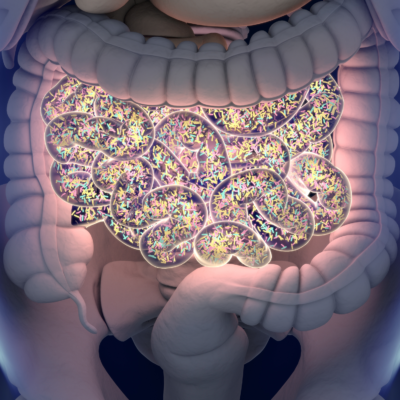March 28, 2018 – At the NRI, we are conducting pioneering research on the interplay of diet and the gut microbiome in human health. The gut microbiome is a complex community of microorganisms living in our lower intestine; although we have long known of its existence, recent technological advances have allowed us to begin to define the composition and function of this dynamic community. This growing body of research demonstrates vast biologic activity within the gut microbiota, which may have the potential to affect our physiology and help guide health recommendations and interventions.
Our diet contributes to shaping our gut microbiome, and, concomitantly, the microbes in our gut influence our body’s ability to access some health-related compounds that derive from food. The composition of the gut microbiome differs remarkably among people, and an important question is how those differences may influence individual variability in the effects of dietary components on health. Although we can intuitively appreciate how the same diet may impact people differently, these pathways have not been sufficiently defined to guide personalized dietary recommendations or interventions. The gut microbiome may play a key role in moving us towards such precision nutrition approaches.
The gut microbiome serves as a type of nutritional filter by generating health-related compounds from the food we eat. We derive from food an enormous number of health-related bioactive compounds, many of which rely on gut microbes for their production. For example, soy is postulated to protect against certain cancers and cardiovascular disease risk factors. However, findings from large-scale population studies have not been consistent, indicating that there are undefined sources of variability in the associations between soy and health outcomes. One possible explanation is that soy influences people differently, potentially through differences in the gut microbiome. Soy is a rich source of compounds called isoflavones. Isoflavones can be converted to a metabolite called equol. Equol is considered an important bioactive component of soy, but not everybody produces equol. The conversion of isoflavones to equol relies, in part, on gut microbial activity. These findings raise the question of whether, to some extent, observed variability in the health effects of soy may reflect individual variability in the production of equol, driven in part by individual differences in gut microbiota.
We believe that characterizing variability in biologic activity related to nutrition and the gut microbiome is a necessary step toward unlocking the full potential for diet to optimize health. Therefore, we have initiated a study to define individual variability in the generation of several compounds that rely on the gut microbiome for production and that derive from dietary components, including equol from soy. Study participants will consume a diet of known nutritional content, ingest several supplements, and collect biologic samples that will allow us to define their production of specific compounds (through the analysis of their urine). We will link this information to data on the gut microbiome—obtained from participant fecal samples—to map connections between diet, the gut microbiome, and the production of health-related compounds derived from dietary components. In future large studies, we will test our hypothesis that gut microbiome-dependent variability in the production of these compounds contributes to variability in health outcomes.

